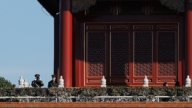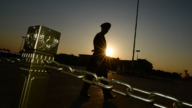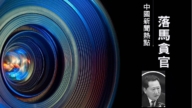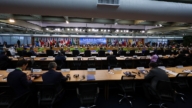【新唐人2012年7月23日讯】近年来,中共与日本、越南、菲律宾等国,为争夺海洋主权,摩擦不断,一度剑拔弩张。另一方面,中共内部最高权力的交替与角逐也日趋白热化,在此之前曾有传言,今年中共18大之后,胡锦涛将留任军委主席至少两年。最近香港媒体报导认为,当前中国大陆和周边国家的紧张局势,为胡锦涛留任军委主席增加了理由。
香港《明报》指出,目前南海和中日钓鱼岛的局势都十分紧张,擦枪走火的机会很大,大陆中央军委的压力加大。这使得胡锦涛有更大的理由,在卸任中共总书记和国家主席职位后,继续担任中央军委主席。
对此,《北京之春》杂志主编胡平向《新唐人》表示,中共在这些冲突上只是制造声势而已,并不会真正动武,所以这件事情与胡锦涛留任军委主席没有太大关系。但如果真的爆发军事冲突,确实会强化军委主席对军队的掌控。
胡平:“你现在有机会能够以军委主席的名义发号施令,这么一来,就好像是比较名符其实了。所以如果在南海上,中共军队要有所动作的话,当然对胡锦涛是有利的。”
今年4月,重庆前市委书记薄熙来被解职的同时,卷入薄熙来、周永康“政变”丑闻的中共国防部长梁光烈到南方调研,要求把边海防摆在重要位置,“在重大任务中当尖兵”。同一时期,南海冲突爆发。 4月8号,菲律宾海军军舰将中国渔船堵在黄岩岛,并登船检查﹔4月10号中国海监船赶赴争议海域,中菲对峙发生。
《新纪元》周刊指出,梁光烈原本想通过南海黄岩岛危机,以“党内团结、一致对外”的名义保下周永康甚至是薄熙来,但受到胡锦涛的警告后,梁光烈态度软化,声称:“军方行动要根据国家外交需要。”
6月下旬,同样曾经是中共盟友的越南,将西沙群岛和南沙群岛纳入主权和管辖范围。大陆民政部则宣布设立三沙市,管理西沙、南沙及中沙群岛,由此引发了越南国内连续的反华游行。
胡平:“我想在南海问题上,中国(中共)的处境比较为难。因为它(中共)知道,原来中国自己单方面宣布的什么‘九段线’那个界线,是并没有得到国际公认的。”
胡平指出,中共政府很清楚这一点,但又不愿意和其他国家坐下来商谈,所以就采取回避的态度,只是笼统的说“共同开发”或者“搁置争议”。
另外,中日之间关于钓鱼岛主权的长期冲突,最近也日益升级。
胡平:“日本当然国力、军事力量,比南海那些国家要强大得多,所以这么一来,它(中共)就陷在好几个问题中间。我想,中共到目前为止,它也就是口头上嚷嚷,真正要采取军事行动,我觉得可能性还是非常之低。”
据了解,钓鱼岛诸岛共由5个小岛组成。 1932年,日本政府将其中4岛卖给私人,现在的岛主是栗原家族。 《BBC》中文网报导,继日本东京都今年4月宣布为保护领土而准备购买这4个岛屿之后,日本政府也开始与岛主联系,商谈购买事宜,因而引发中方抗议。
采访/常春 编辑/李谦 后制/朱娣
Disputes in South China sea will help secure Hu Jintao’s
position as military Head, according to Hong Kong media.
In recent years, the CCP frequently conflicted with Japan,
Vietnam and Philippines on sovereignty over sea areas.
The situation had once been tense with the CCP and its
neighbouring countries, at daggers drawn.
On the other hand, the power struggle inside the CCP
also becomes increasingly fierce.
There have been rumors mentioning Hu Jintao will stay on
as Chairman of the Central Military Commission for another two years, after the 18th National Congress.
Recent reports from Hong Kong media believe that,
the tensions between China and neighbouring countries, has
provided excuses for Hu to stay longer as the military head.
According to HK Ming Pao, as the tension over the South
China Sea and Diao Yu (Uotsuri Jima) Islands increased,
there was a decent chance some military clashes
would break out;
this has placed even more pressure upon CCP’s
Central Military Commission (CMC).
Ming Pao believes, such situations have provided Hu Jintao
great reason for staying on as Chairman of the CMC,
once retired from post of CCP general secretary
and president of China.
Hu Ping, Chief Editor of Beijing Spring magazine, told NTD that,
the CCP was only bluffing by making small conflicts,
while it wouldn’t really initiate war; therefore the tension
had little to do with Hu’s stay as Chairman of the CMC.
However, if clashes really break out, Hu’s control over the army
as the military head would be significantly strengthened.
(Hu Ping): “Of course it makes you look more like a real
military head if there’s a chance to command the army.
If the CCP’s army makes significant moves in the South
China Sea, it will benefit Hu Jintao and his faction.”
When former Chongqing CCP secretary Bo Xilai was
dismissed this April,
the involved Defense Minister Liang Guanglie
made a visit to the southern part of China.
During his trip, Liang emphasized the importance of
frontier and coast defense,
calling upon the soldiers to “play the role of vanguards”
in accomplishing missions.
In the same month, the conflict in the South China Sea
broke out.
On April 8th, the Philippine Navy stopped and inspected
Chinese fishing boats at Huangyan Island (Scarborough Shoal).
On April 10th, China sent marine surveillance ships to the
disputed sea area, which initiated the confrontation between China and Philippines.
An Epoch Times weeklyarticle remarked,
Liang Guanglie had attempted to protect Zhou Yongkang,
even Bo Xilai in the name of “Unite inside the party to counter
foreign forces” as the Huangyan Island crisis broke out.
However, after a warning by Hu Jintao,
Liang changed his attitude,
claiming “the army’s move should be subject to
diplomatic needs of the country”.
In late June, a once-ally of the CCP Vietnam,
claimed Xisha (Paracels) and Nansha (Spratlys) were under its sovereignty.
Meanwhile, China announced that a new prefecture-level
city of Sansha was established to administer the Xisha,
Nansha and Zhongsha Islands (Macclesfield Bank).
This news since induced a chain of anti-China
demonstrations in Vietnam.
(Hu Ping): I think the CCP is in a difficult situation in the
disputes over the South China Sea,
the nine-dotted line CCP claimed to have demarcated in
such areas, was not acknowledged by the global society.”
Hu Ping remarked, although the CCP knew clearly
about it, it was not willing to negotiate with other countries;
therefore it evaded the sovereignty problem by vague
statements such as “pursuing joint development” or “setting aside disputes”.
In addition, the long-term territorial dispute over Diao Yu
Islands between China and Japan, had recently escalated.
(Hu Ping): “Of Course Japan’s military power is much
stronger than the countries’ in the South China Sea.
The CCP hence found itself trapped in several trouble spots
at the same time.
I believe that the CCP is only making oral disputes.
There’s little chance that it will make any real military moves.”
Diao Yu Islands consist of five islets. In 1932, the Japanese
government sold four of them to private owners.
Currently these islands are owned by Kurihara’s family.
According to a BBC report, after the Tokyo government
announced it would purchase the four islets to protect Japan’s territory,
the Japanese government also contacted the owner in negotiating the trade,
which led to protests from the CCP government.





























